
Post-Traumatic Stress Disorder (PTSD)
A Non-Invasive, Drug-Free Neuromodulation Approach
for PTSD Symptom Management
Advanced magnetic brain stimulation guided by EEG analysis, provided by board-certified neurologists.
A Different Approach for Persistent PTSD Symptoms
Post-Traumatic Stress Disorder (PTSD) can develop after experiencing or witnessing traumatic or life-threatening events. While some people gradually recover, others continue to struggle with symptoms that affect sleep, mood, concentration, emotional regulation, and daily life.
At Brain Treatment Center Fort Worth, we offer a non-invasive, medication-free neuromodulation approach for individuals whose PTSD symptoms have not resolved with traditional care. Treatment is guided by objective brain data and overseen by board-certified neurologists with experience treating trauma-related conditions.
Understanding PTSD
PTSD is not limited to combat veterans. It can affect anyone who has experienced or witnessed severe trauma, including:
- Physical, emotional, or sexual abuse
- Serious accidents or injuries
- Violence or threats to life
- Prolonged exposure to extreme stress
- Childhood trauma
- Combat or military service
- Life-altering illness
Symptoms may appear immediately or months or years later, and often coexist with anxiety, depression, sleep disturbance, or emotional numbing. Triggers can cause symptoms to resurface long after the original event.
According to the National Institutes of Health, approximately 3.6% of U.S. adults experience PTSD each year.
Neuromodulation for PTSD and Co-Occurring Depression
PTSD frequently affects brain networks involved in emotional regulation, fear response, sleep, and mood. Many individuals with PTSD also experience clinical depression, which can intensify symptoms and complicate treatment.
Repetitive Transcranial Magnetic Stimulation (rTMS) is a non-invasive therapy that uses magnetic pulses to stimulate targeted regions of the brain involved in mood and regulation.
While rTMS is FDA-cleared for Major Depressive Disorder, it has also been studied extensively for trauma-related symptoms—particularly when PTSD and depression occur together. Clinical studies involving veterans and active-duty service members have shown that rTMS may help reduce:
- Depressive symptoms associated with PTSD
- Sleep disruption
- Hyperarousal
- Anxiety

TRICARE Coverage for TMS When Depression Is Present
For patients with PTSD and co-occurring depression, insurance coverage may be available.
TRICARE has covered FDA-cleared rTMS treatment for Major Depressive Disorder since 2016. When depression is a diagnosed condition—and especially when it has not responded adequately to medication—TRICARE may cover rTMS treatment, even when PTSD is also part of the clinical picture.
Coverage is based on medical necessity and individual eligibility. Our team has extensive experience working with:
- Active-duty service members
- Veterans
- Military families
We help guide patients through verification and explain coverage clearly before treatment begins.
What is MeRT® and How Does it Fit In?
MeRT® (Magnetic e-Resonance Therapy) is a highly individualized, EEG-guided approach to neuromodulation.
Rather than using standardized stimulation settings, MeRT incorporates:
- Quantitative EEG (qEEG) brain mapping
- Heart–brain data (EKG)
- Individualized targeting of stimulation location and frequency
This allows clinicians to tailor neuromodulation delivery based on how each person’s brain is functioning.
The neuromodulation devices used in MeRT are FDA-cleared for depression and OCD. MeRT itself represents an advanced clinical approach that builds upon rTMS technology by personalizing treatment using objective brain data.
During your initial consultation, we explain:
- Whether standard rTMS may be appropriate
- Whether an EEG-guided approach may provide additional insight
- What options make sense based on diagnosis, goals, and insurance considerations
What PTSD Treatment Involves
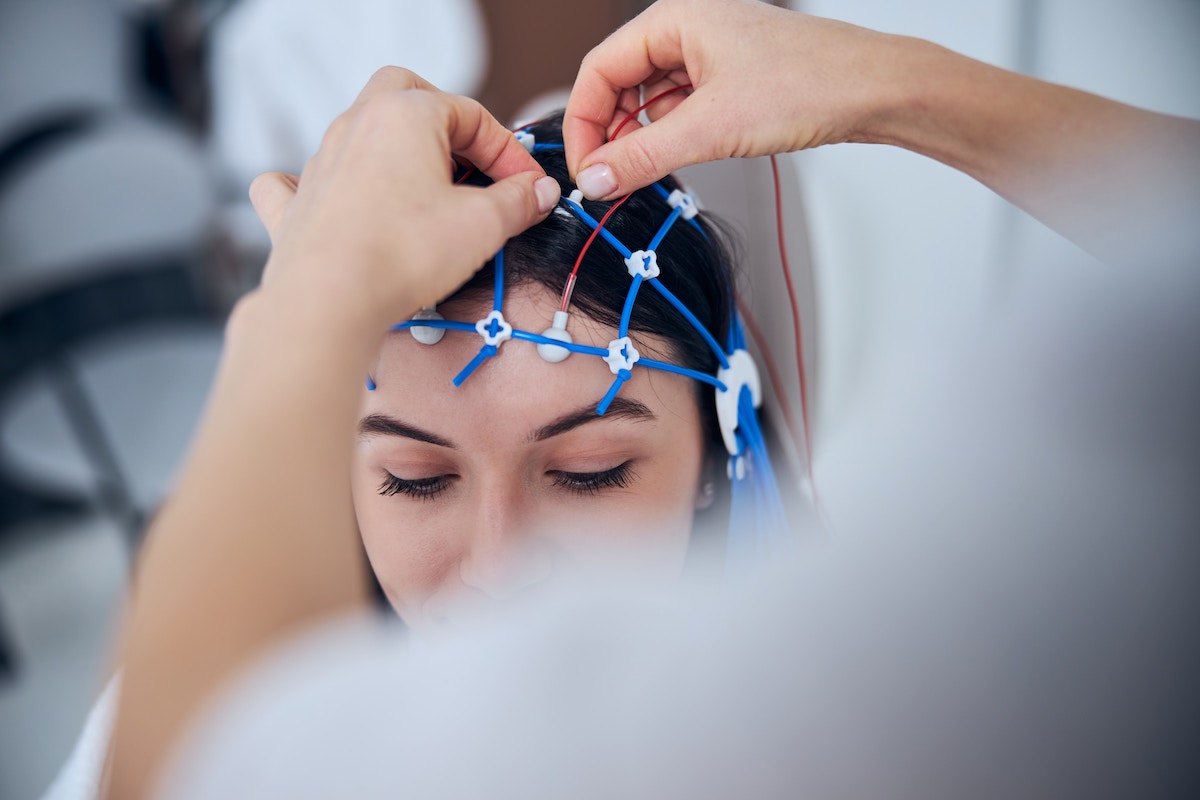
Evaluation
Care begins with a clinical evaluation and non-invasive testing, including a qEEG and EKG, to help guide treatment planning.
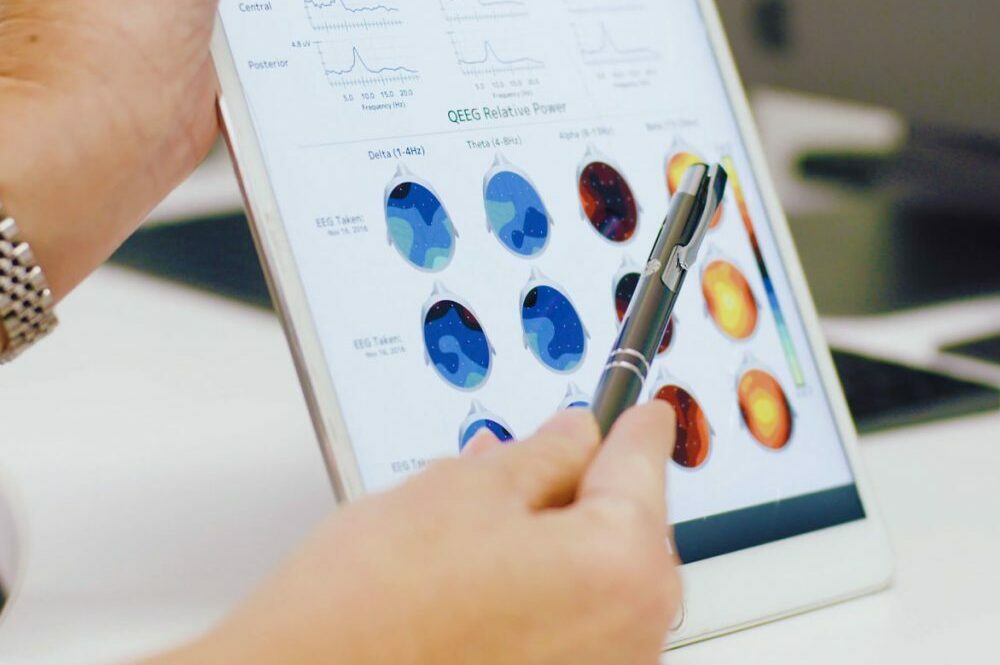
Treatment Planning
Doctors develop an individualized TMS protocol based on clinical findings and brain data.
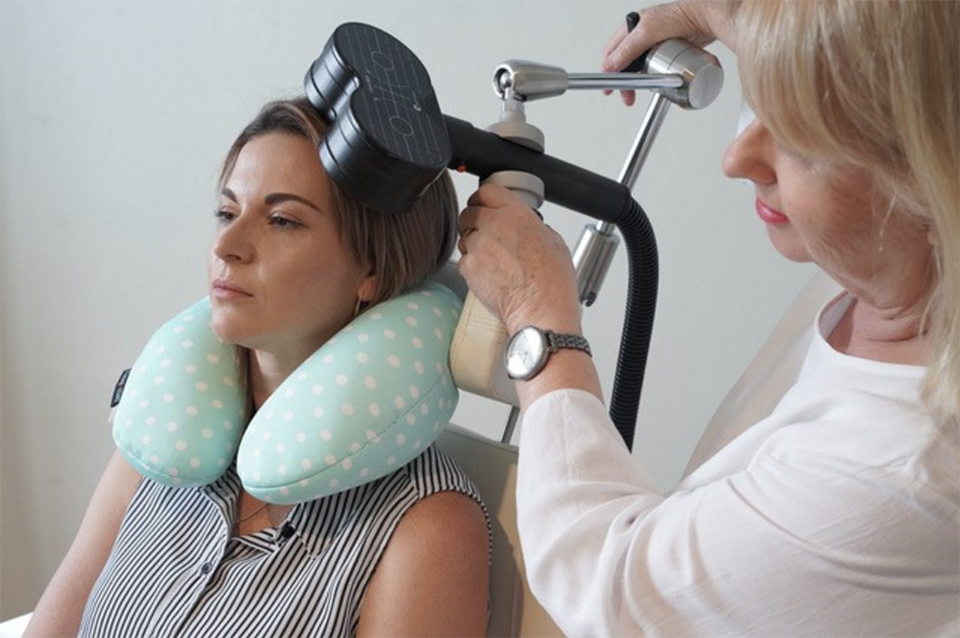
TMS Sessions
You receive treatment while sitting comfortably in a chair. Sessions typically last about 30 minutes and are well tolerated.
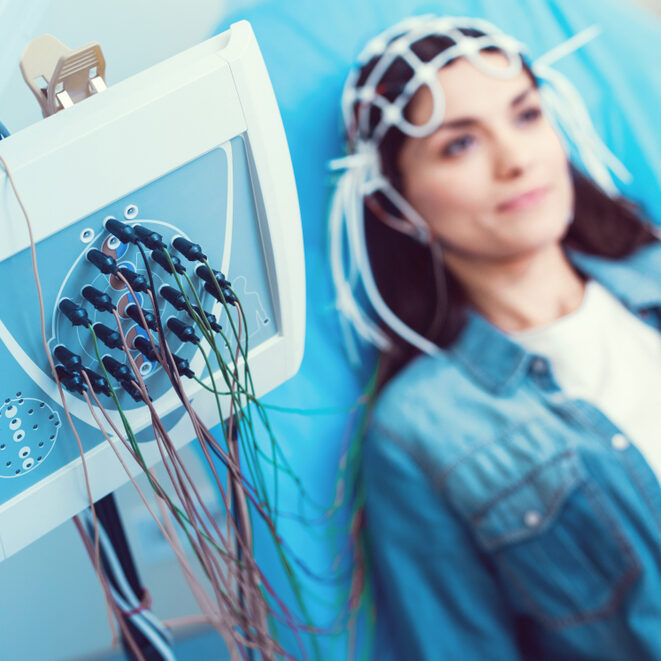
Ongoing Monitoring
We monitor progress throughout the course of care, which lasts approximately 4-6 weeks. Your clinician may make adjustments based on clinical response.
Clinical Research Supporting This Approach
Neuromodulation using rTMS has been studied extensively for trauma-related conditions, including PTSD. Findings include:
- Significant reductions in PTSD and depression symptoms in active-duty military populations
- Improvements in sleep quality and avoidance behaviors
- Strong safety and tolerability outcomes
- Promising results in EEG-guided and alpha-frequency-targeted protocols
Research continues to expand, particularly in military and veteran populations.
A retrospective chart review to assess the impact of alpha-guided transcranial magnetic stimulation on symptoms of PTSD and depression in active-duty special operations service members, 21 June 2024.
“This data provides a demonstration of significant reduction in PTSD and depression symptoms and safety with the application of a-rTMS in active-duty special operations military personnel. Expansion of targeted neuromodulation programs could be impactful for military and civilian populations.”
How Electric Therapy Is Curing Navy SEALs of PTSD, Jan 2019.
“Hundreds of vets have tried out an experimental new treatment that could change how the world addresses mental disorders.” And, “All said that they saw big improvements after a course of therapy that ran five days a week for about four weeks.”
Synchronized transcranial magnetic stimulation for posttraumatic stress disorder and comorbid major depression:
“All participants demonstrated significant reductions in PTSD and MDD symptoms (all p < .001). As expected, there were significant reductions in symptoms in both treatment groups, but active stimulation did provide greater reductions in count of PTSD moderate-to-severe symptoms.”
Magnetic Resonance Therapy Improve Clinical Phenotype and EEG Alpha Power in Post-traumatic Stress Disorder, in Trauma Monthly, November 2015.
‘This study suggests that non-invasive neuromodulation magnetic resonance therapy may lead clinical improvements as well as a trend toward normalization of EEG pathophysiology in PTSD.”
Magnetic E-Resonant Therapy Alleviates Combat Related Post-traumatic Stress Disorder, in Aerospace Medical Association, March 2017.
“Our preliminary results suggest that transcranial MeRT may provide an alternate method to help veterans suffering from PTSD.”
Individualized Electromagnetic Treatment in Post-traumatic Stress Disorder: a Randomized, Double-blind, Sham-controlled Trial, Poster Accepted, Taghva, et al.
“This double-blind, randomized, controlled trial shows that transcranial magnetic therapy based on individualized frequencies derived from EEG/EKG is an effective therapy for PTSD in improving overall symptoms and quality of sleep.”
EEG_EKG Guided TMS in veterans with PTSD_Randomized double-blinded pilot study.
“Following 2 weeks of EEG-EKG guided transmagnetic stimulation, significant changes in symptom severity and EEG measures are reported for 80 retired military veterans with post-traumatic stress disorder. Patients had greatest comparative reductions in PCL-M subscales VII “avoid situation indicator” XII “short future indicator” and XIII “trouble falling or staying asleep indicator”. The improvement in sleep was confirmed for treated vs sham group in PSQI-A, and, may suggest correlation between sleep disorder and PTSD symptoms. Of the 37 patients who had suicidal ideation by HAM-D, 29 patients denied ideation by 4 weeks. No patient worsened in clinical PTSD symptoms after receiving therapy. “
Low-frequency, Repetitive Transcranial Magnetic Stimulation for the Treatment of Patients with Posttraumatic Stress Disorder: a Double-blind, Sham-controlled Study, Nam et al, 2013.
“The present study showed low-frequency rTMS to be an effective and tolerable option for the treatment of PTSD. Trials using variable indices of rTMS to the right prefrontal cortex and explorations of the differences in the effects on specific symptom clusters may be promising avenues of research regarding the use of rTMS for PTSD.
Hear from Veterans who received PTSD Treatment with MeRT
Meet Your Neurologist
Dr. Spencer O. Miller, MD
Board-Certified Neurologist | Medical Director
Dr. Miller is the Medical Director of Brain Treatment Centers in Fort Worth, Dallas, and Plano. He has over 15 years of clinical experience and spent five years as a physician in the U.S. Air Force, where he treated service members with PTSD and traumatic brain injury.
He specializes in neuromodulation-based care for PTSD, depression, TBI, autism, dementia, and other neurological conditions, and oversees all treatment protocols at the Texas clinics.
MeRT for PTSD Treatment Testimonials
“THANK YOU SO VERY MUCH for your help with TMS/MeRT for my PTSD symptoms! Refiring those frontal lobe neurons had me reading ten novels in six months! I’ve NEVER read that many in ALL my prior life!
“The confusion, distraction, and memory issues were greatly reduced. The treatment does wonders. And whatever you did last time had an unexpected, incredibly wonderful effect. Besides helping with my sciatic, shoulder, and leg pains, I STOPPED TAKING OXYCODONE A WEEK AFTER, COLD TURKEY, unexpectedly AND WITH ZERO WITHDRAWAL SYMPTOMS!
“IT WAS LIKE I’D NEVER TAKEN THEM, but the truth is that I did for at least a decade prior. It was Vicodin for the decade prior to that. Now, while I do have some pains, I take NO OPIODS! I manage with ibuprofen, and Tylenol. This is worth every penny. THANK YOU!”
PTSD Patient
Patient“We have seen a dramatic change in Alex. He is so calm, happy, and positive. He wakes more alert. The man I knew was inside of him has finally come out. We are so much closer as a couple, and the relationship between our kids and him is much more functional.
“The VA has treated him for the past six years, and he’s undergone so much individual and group therapy, but it has NEVER had this positive effect on him. I will forever be grateful.”
Wife of Army Veteran
“Of all my injuries, by far the worst were the ones you could not see. I had degraded to the point of not being able to leave my home because of panic attacks and severe anxiety. I could not hide from this feeling, and no medication could numb it.
“At one point, I told my doctor I couldn’t kill myself because I have a family with young children that I am responsible for. I was living in despair and physical pain every day without reprieve — that is, until I was able to get treatment.
“I underwent neural restorative therapy [MeRT] for two months with total symptom resolution. Now I can function again at work and can spend much-needed time with my family. I have my sense of well-being back and a clarity of thought I haven’t had in many years.”
US Army Veteran
“With being diagnosed with PTSD, depression, and anxiety by Veterans Affairs, a calm and welcoming environment is important. The treatment makes me sleep longer and deeper than before treatment. My ‘dark feelings’ fade away. I feel happy and calm.”
Sean K.
“Within four days of being treated, I was sleeping through the night. My anger had subsided significantly, and I was smiling and enjoying things again. I was able to focus and concentrate on information much more efficiently and easily and did not get lost in conversation as I had prior to coming to BTC. My chronic headaches had ceased, my balance was returning, and my ringing in my ears (tinnitus) had also ceased.”
Marine EOD Tech
Patient“The experience I had at BTC was nothing short of a miracle. The treatment I received has completely changed my life for the better.
“I was able to reset my circadian rhythm and sleep through the night without medication. My nightmares became few and far between. My anxiety lessened almost immediately, and I became able to do the things I used to enjoy, like going to the gym, cooking, and reading.
“I could focus my attention again, and my mood lightened a lot. My fiancé and family immediately noticed the change in me and said that it was like they had gotten their ‘old’ Sarah back.”
US Army Veteran
PatientA Conversation with Dr. Erik Won on The Broken Brain Podcast
The Broken Brain Podcast, which explores the connection between brain function and overall health, featured an in-depth discussion on EEG-guided neuromodulation approaches, including Magnetic e-Resonance Therapy (MeRT).
In this episode, Dr. Erik Won, President and Chief Medical Officer of Wave Neuroscience, discusses how individualized neuromodulation strategies are being studied and applied in patients with complex neurological and trauma-related conditions, including PTSD, traumatic brain injury (TBI), and depression—particularly within military and veteran populations.
Dr. Won also reviews emerging clinical insights, explains how EEG data informs treatment decisions, and shares observations from working with patients whose symptoms persisted despite conventional care.
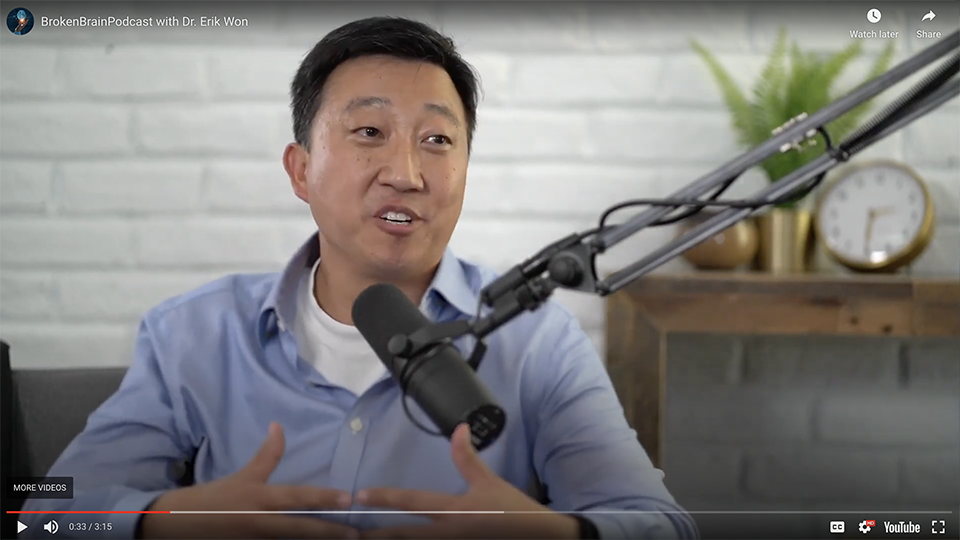

Is This Approach Right for You?
This care may be appropriate if:
You have been diagnosed with PTSD
Symptoms persist despite therapy or medication
You are seeking a non-drug, non-invasive option
You want care guided by objective brain data
A consultation and brain scan help determine whether this approach may be beneficial.
Contact Our New Patient Coordinator
No pressure. No obligation. Just information.
Our New Patient Coordinator is available to:
- Answer questions about treatment options
- Explain the evaluation process
- Discuss insurance and payment considerations
- Help you decide next steps
Call: 817-477-6991
Or fill out the form below to request more information.

